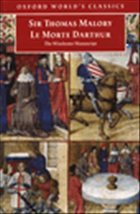The definitive English version of the stories of King Arthur, Le Morte Darthur was completed in 1469-70 by Sir Thomas Malory, `knight-prisoner'. In a resonant prose style, Malory charts the tragic disintegration of the fellowship of the Round Table, destroyed from within by warring factions. Recounting the life of King Arthur, the knightly exploits of Sir Lancelot du Lake, Sir Tristram, Sir Gawain, and the quest for the Holy Grail, Le Morte Darthur depicts the contradictions that underscore the Fellowship's chivalric ideals. A pervading tension cumulates in the revelation of Lancelot and Guenivere's illicit passion, and in Arthur's powerlessness to prevent a related outbreak of violence and revenge. This generously annotated edition is based on the authoritative Winchester manuscript and represents what Malory wrote more closely than the first version printed by William Caxton. Intelligently abridged from the original to make a single substantial volume, the translation is supplemented by a fine Introduction, a Glossary, and extensive Notes
The greatest English version of the stories of King Arthur, Le Morte Darthur was completed in 1469-70 by Sir Thomas Malory, `knight prisoner'. This generously annotated edition, in a new abridgement by Helen Cooper based on the Winchester manuscript, represents what Malory wrote more closely than the first version printed by William Caxton.
The greatest English version of the stories of King Arthur, Le Morte Darthur was completed in 1469-70 by Sir Thomas Malory, `knight prisoner'. This generously annotated edition, in a new abridgement by Helen Cooper based on the Winchester manuscript, represents what Malory wrote more closely than the first version printed by William Caxton.
